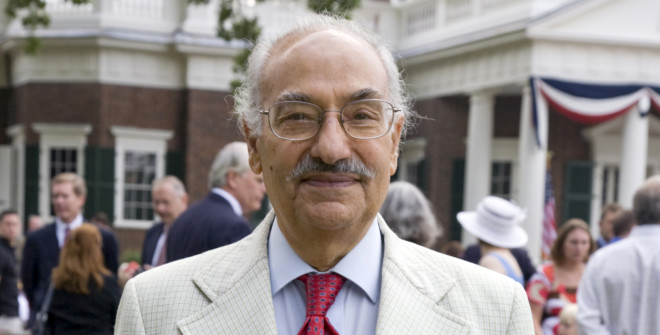UVA professor emeritus Rouhollah K. Ramazani, better known as Ruhi, died October 5 from complications of a fall at age 88.
The Edward R. Stettinus professor of government and foreign affairs at UVA came to the school in 1952, after decamping quickly from Iran, where his life could have been in danger had he stayed. During his long career, he always said freedom of speech was the main reason he immigrated to the United States.
“Absolutely,” confirms Nesta Ramazani, his wife of 64 years, who came with him from Iran.
“It’s hard to imagine the University of Virginia without Ruhi,” says Center for Politics founder Larry Sabato. “He’s been here forever and was always deeply involved with the university. He was one of the first people you consulted before you did anything.”
Ramazani taught UVA’s first course on the Middle East in 1953, joined the faculty in 1954, and wrote a dozen books on Iran’s foreign policy, scores of articles and founded the Middle Eastern Studies department.
During the Iran hostage crisis in 1979, President Jimmy Carter consulted him, and he became known as the “dean of Iranian foreign policy studies” in the U.S. “He played an important advisory role,” says Sabato, and he used his contacts in Iran to work toward improved relations with the United States, for decades, as it turned out.
When the U.S. reached a nuclear deal with Iran in 2015, “he was delighted to see that finally happen,” says Sabato. “Ruhi deserves credit for it.”
Sabato has described Ramazani as his mentor. “He hired me,” says Sabato. “He was chair of the politics department. I was at Oxford and getting ready to go to Yale Law School. He talked me out of it. He said, “Try teaching for a few years and see if you like it.’ Ruhi was really persuasive.”
“He took great pride in nurturing faculty and he supported promising young scholars,” says his son, Jahan Ramazani, who is a professor in the English department at UVA. “He’d point to teaching as fundamental to what he did. He was energetic and demanding.” And when some of his students became ambassadors to the Middle East, they were well-equipped with an understanding of the region, he says.
Ramazani always subscribed to the Jeffersonian ideal of the university as a site for “illimitable freedom of the human mind,” says his son, and he was profoundly committed to the school. “The university when he first arrived was not globally oriented. He and others gave it a more international profile.”
Jahan Ramazani notes his father’s “amazing” diplomatic skills and his collegiality.
Sabato says that whenever there was a crisis at the university, the elder Ramazani was in the mix. “I consulted him, I can tell you, I don’t know how many times. He was an enormously wise person who knew instinctively what needed to be done. Ruhi had it all planned out, and if you followed his instructions, things usually worked out.”
Ramazani was awarded the university’s highest honor, the Thomas Jefferson Award, in 1994. In 2011, Jahan Ramazani also received the award, and making the pair the first father and son to do so.
When Ruhi and Nesta Ramazani sailed to the United States in 1952 on the Ile de France, they left Iran during a time of intense and often deadly political turmoil. He has recounted being a student at the University of Tehran when thugs charged in, killing a dean and a classmate and then looking for him. Ramazani chanted, “Get Ramazani,” along with the mob running through the halls, and escaped.
“You could easily get killed for not having the right political views,” says Jahan Ramazani. “I think he realized with his devotion to freedom of the mind and truth seeking, that wasn’t an environment where that could be tolerated or fostered.”





















